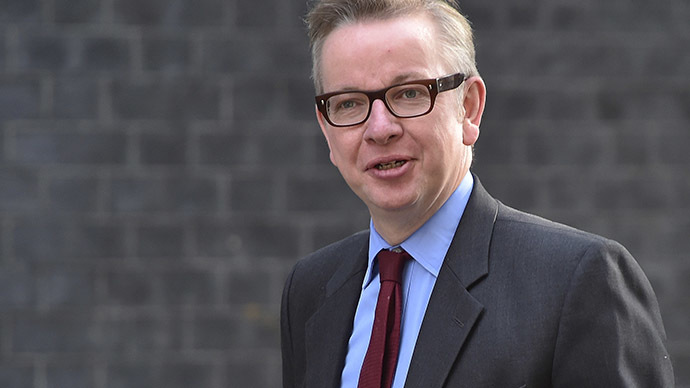Tories’ repeal of Human Rights Act will spark constitutional crisis, erode civil liberties – experts

Newly appointed Justice Secretary Michael Gove will push ahead with Conservative plans to repeal the Human Rights Act – a move experts warn could spark a constitutional crisis and blight Britain’s reputation on human rights worldwide.
Conservative Party sources, fresh from last week’s general election victory, told the Guardian the human rights reforms are imminent.
Civil liberty advocates warn the soon-to-be implemented measures would erode the right to life, the right to privacy, the right to a fair trial, the right to protest and the right to freedom from torture and discrimination.
READ MORE: What can UK voters expect from Tory majority govt?
Although the Tories were keen to push ahead with the legal changes during their last term in government, the move was blocked by the party’s ex-coalition partner the Liberal Democrats. But as a majority government, the Conservatives are now poised to push ahead with the reforms.
Central to the Tories' election manifesto was a pledge to repeal the Human Rights Act (HRA) and significantly curb the power of the European Court of Human Rights (ECHR) in Britain. The legal reforms are expected to surface in PM David Cameron’s plans for his first 100 days, which will be outlined in the Queen’s Speech on May 27.
Under these changes, the Conservatives would replace the HRA with a Tory-styled British Bill of Rights. Britain’s Supreme Court would no longer be answerable to the ECHR, with the Strasbourg-based court losing the power to order changes to UK law.
The plans were drawn up in 2014 by then-Secretary of State for Justice Chris Grayling. At the time, Grayling proposed Britain withdraw from the ECHR if the Council of Europe rejects the Conservatives’ British Bill of Rights.
Constitutional crisis
Considerable doubt exists among experts that the Council of Europe, a human rights watchdog responsible for ensuring the Convention is upheld, will accept the Tories’ proposals. As a result, it is widely believed Britain will disengage from the European Convention on Human Rights and undermine Europe’s’ civil liberties framework in the process.
Britain’s withdrawal from the ECHR has been strongly opposed by former Secretary of State for Justice Kenneth Clarke and the UK’s ex-Attorney General Dominic Grieve. Grieve has long condemned the proposal, warning its consequences would be devastating.
In December, he said the government’s threat to potentially abandon the Strasbourg court undermines international law and could fray the constitutional fabric that holds the United Kingdom together. Echoing grieve, analysts warn such a withdrawal would spark a constitutional crisis in the UK.
READ MORE: Coalition’s human rights record tainted by blundering reforms – barrister
They suggest the move would be flatly rejected by Nicola Sturgeon’s Scottish Nationalist Party (SNP) and would mean the Conservative government has violated Northern Ireland’s 1998 Good Friday Agreement.
Dr Paul O’Connell, a Reader in Law at the University of London’s School of Oriental and African Studies (SOAS), says the Conservatives’ proposed bill is shrouded with ambiguity.
“The notion of a British Bill of Rights is still quite vague, and more rhetoric than substance at present,” he told RT on Monday.
O’Connell, whose expertise lies in the field of human rights law, international law and the relationship between law and social change, said repealing the Human Rights Act would prove disruptive for Britain.
O’Connell rejected the notion such a move would breed a constitutional crisis in the UK, but argued the policy change would lead to a “recalibration of the culture of British law.”
“Withdrawing from the ECHR is difficult, it's hard to imagine that the new government will, in fact, seek to do this,” he said.
“They may, however, take a harder line with decisions from the European Court of Human Rights (ECtHR), and may lobby other members of the Council of Europe to reform the Court.”
Eroded civil liberties
Mairi Clare Rodgers, media director at human rights group Liberty, argued the Conservatives’ plans to scrap the Human Rights Act hold serious implications.
The Act has proven vital in protecting journalists’ sources, safeguarding British soldiers, offering much needed-answers to grieving families, and holding power to account, she said.
Mairi also emphasized the HRA's role in defending those who suffer from domestic violence, rape victims and those who require specialist care.
READ MORE: Human rights debate in Britain is ‘regressive’ – Scottish watchdog
Executive director at Reprieve, Clare Algar, said successive UK governments have undermined Britons’ ability to hold politicians to account.
“We hope that Mr Gove ignores the myths and spin that many others have used against human rights legislation, and considers instead the important central principles,” she told RT.
“This is something which helps defend the weak from the strong, and the individual citizen from the abuses of government.”
Amnesty International UK’s Allan Hogarth said the Human Rights Act has been misrepresented by a series of myths.
"Despite all the myths peddled about the Human Rights Act, this valuable piece of legislation has helped ensure that principles of fair trial, free speech and the right not to be tortured are properly respected in our country,” he told RT.
“Whatever the politicking in the coming weeks, the Human Rights Act should be protected and Michael Gove should stand firm over the Act's fundamental principles of justice and decency.”












